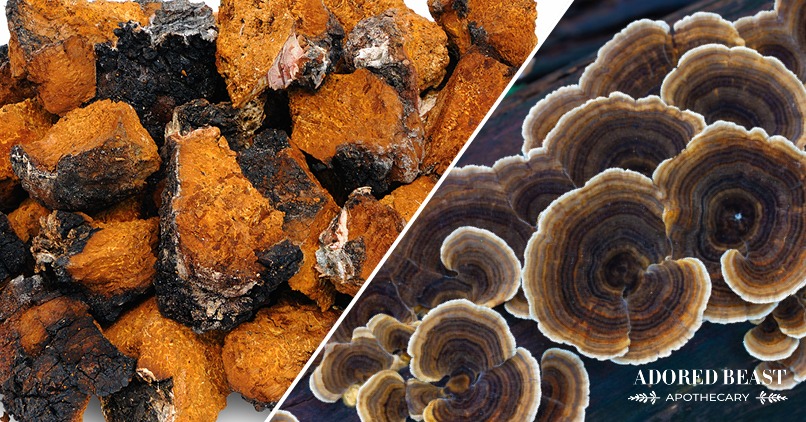When it comes to fungi, Mother Nature offers us an impressive array of medicinal mushrooms that are amazing for health.
And the majority of these medicinal mushrooms carry similar values when it comes to health. Polyphenols, triterpenes, beta-glucans, antioxidants… most medicinal mushrooms contain some or all of these elements.
That being said, each mushroom, as a whole food, carries its own unique signature, and different things they give to the body. Where they grow, how they grow, what they look like are all things that impact those characteristics.
Each mushroom has a different contribution to the body.
So, chaga vs turkey tail mushrooms: what’s the difference and is one better than the other?
Chaga vs Turkey Tail Mushrooms
Like all their mushroom brethren, there are many similarities between Chaga and Turkey Tail mushrooms. Turkey tail and chaga both grow from a tree, out of the tree, whereas other mushrooms, like cordyceps, grow out of the ground, in a more individual way, like they don’t have a specific host that we see with our naked eye.
But it’s not how they grow that makes them so impressive…
To name a few of their benefits:
- Chock full of antioxidants. In fact, chaga is one of the richest antioxidant food sources on the planet. Antioxidants fight free radicals, which are damaging compounds that our animals (and us) encounter over the course of our daily lives. These free radicals build up in the body, causing oxidative stress, and this oxidative stress is linked with accelerated aging, cell and tissue damage, and they’re often at the root of many chronic diseases, including cancer, diabetes, joint disease, and heart disease.
- Powerful immune modulators. This means that they recognize what the immune system needs and provide it. Rather than just boosting the immune system or down-regulating it, these mushrooms can tell when an immune system needs a little help, or when it needs assistance calming an immune response down.
- Good for gut health. Research proves that both can help to encourage the growth of friendly, beneficial bacteria in the gut. And since gut health is critical to overall health, that’s an important benefit!
- Anti-tumor/anti-cancer properties. Research shows that chaga mushrooms have several anti-cancer abilities. These include selective apoptosis (cell death) in tumor cells (with no effect on healthy cells), inhibition of tumor cell proliferation, and anti-mutagenic properties. Turkey Tail mushrooms contain key cancer-fighting components called polysaccharides, which target and attack “oncoviruses” (tumour viruses) and inhibit a number of cancer triggering mechanisms in the body. In fact, they’ve been an approved natural therapy used alongside conventional treatments for cancer since the 1980s in Japan!
As you can see, both of these mushrooms share a lot of the same healthy characteristics. But they also have some slight – but important – differences!
Here are our favourites.
Turkey Tail Mushrooms
One of the things we love best about turkey tail mushrooms (other than the amazing things we just listed above) is the fact that they can reduce Staphylococcus bacteria in the body.
Staphylococcus is very common bacteria associated with skin disease (you’ve likely heard the term staph infection). It’s commonly found on skin or in the nose.
Often animals are put on antibiotics when they have allergies. This is not to address the allergy, but to address the secondary infection on the skin.
For dogs or cats experiencing itching due to allergies or hot spots, turkey tail mushrooms may help to soothe the itch and help prevent infection.
Chaga
One of the things we love best about the chaga mushroom (again, on top of what we boast above) is that it is an adaptogen. Adaptogens are compounds that help boost the body’s resistance to stress.
They do this by supporting the adrenal glands, which are the part of the body responsible for the release of stress hormones. And that’s incredibly important, particularly because of the number of diseases that have been directly linked to stress (ex. Cushing’s disease, Addison’s disease, diabetes, high blood pressure, osteoporosis, depression and anxiety).
Chaga works at a molecular level to help reduce the total stress hormones released by the body and bring it back to balance.
Adaptogens also help support blood sugar regulation, inflammation reduction, metabolism regulation, and memory function (think senior animals).
Which Mushroom is Best?
So, chaga vs turkey tail – is one better?
Like any nutritional food, medicinal mushrooms all target and act differently when you eat them. It’s the same with fruit – apples, blueberries, oranges – they all have similar things (antioxidants, etc.), but you don’t want to eat just one. You want to eat a diverse range to get that whole spectrum of vitamins and minerals and nutritional benefits. The more diversity in the diet, the more protection the body has, and the greater its ability to thrive.
Our bodies aren’t meant to eat the same thing every day… the same goes with our supplements.
In our opinion, no one mushroom is better than the other. Turkey tail and chaga mushrooms both offer the body so much when it comes to health, and so we believe that rotation is key to help the body support and derail disease.
We want to work with the body, and help it detect and derail anything that comes up. We want to give it the tools to approach different assaults on the body. Finite differences in each of these mushrooms have a more specific impact on different conditions. And that’s the importance of diversity – we’re giving more diverse foods and allowing the body to use those diverse tools for healing.
When it comes to mushrooms, as with any supplement, we don’t choose one over the other. Instead, for us, the name of the game is rotation, rotation, rotation. Give your dog’s, cat’s, or horse’s body the diversity it needs to thrive!












